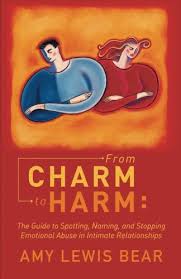
From Charm to Harm: The Guide to Spotting, Naming, and Stopping Emotional Abuse in Intimate RelationshipsAuthor: Amy Lewis Bear (LPCA Member) Book is available in hard copy and electronic formats on amazon.com and other online book retailers. Page count: 215 Book Excerpts:
Introduction Emotional abuse happens when one person uses psychological intimidation to gain control over another for personal gain. The aggressor uses both obvious and hidden tactics to manipulate the other’s feelings and behaviors. Abuse occurs when one person is vulnerable to another, such as in families, between friends and work colleagues, and in every other social and cultural environment where people have relationships. Emotional abuse crosses all boundaries of age, gender, race, culture, religion, socioeconomic status, and sexual orientation. Everyone knows that ugly, offensive words and harsh voices are verbally abusive. In intimate relationships, however, the hallmark of emotional abuse is systematic deception. Abusers deliver their punches under the cover of words and actions that disguise the abuser’s true intention, which is to degrade the other’s self-esteem and take control. People on the receiving end of the abuse don’t easily see the abuser’s campaign of degradation against them. Confused and unaware, they attribute the discord to the aggressor’s personality traits or their own inadequacies. They respond with an endless quest to appease the dominant one and get back into his or her good graces, which contributes to the abuse. Victims disregard themselves and risk the loss of their emotional health and well-being. In nourishing relationships, the partners may argue, criticize each other, and, yes, use emotionally abusive language, but wrongdoers know their behavior is hurtful and inappropriate. They feel remorse, have meaningful discourse, and make genuine efforts to improve. In emotionally abusive relationships, abusers rarely exhibit true repentance. They may issue apologies, but they don’t follow through with actions that prove their sincerity. They stand firm in their justification to do whatever it takes to fulfill their own unhealthy needs and desires. Emotional Abuse Tactics 1) Ambiguous Intent—The intention that underlies many hidden emotional abuse tactics and a particularly effective way to destabilize a partner. Ambiguous intent involves the use of deception, contradiction, inconsistencies between words and behavior, and conflicting verbal and nonverbal language. Those with ambiguous intentions appear to love and nurture their partners, but their actual intentions are to create self-doubt and confusion for better control. Marla & Judd After returning home, Marla complains to Judd that his actions were way out of line. Judd gives the impression that he is trying to have a meaningful conversation to resolve the issue, but he hides his intent, which is to plant guilt and uncertainty in her mind. He puts his arm around her and says, “Don’t you realize that I was just kidding? You know I love you more than anyone in the world. I would never want to hurt you.” In an effort to understand him, she asks him to explain why he made her the butt of a joke, but he blocks her objections with the claim that she doesn’t listen to him. She finds it difficult to react because his words don’t fit his actions, and there’s no clarity in what he says. Marla isn’t sure whether or not she overreacted to Judd’s comments. The more she tries to comprehend his actions, the more he confuses her with platitudes, denial, and blame. In the end, she is overcome with despair, and the original issue is left unresolved. 2) Crazy-making—To drive a partner into a frenzied state of mind with repetitive displays of unreliability, irresponsibility, hurtfulness, or deceit. Crazy makers deny or downplay the harmful effects of their actions on their partners. Paula & John One night the electricity goes out as Paula is preparing dinner. She loses her composure and screams at John to stop being so negligent. He tells her that she needs to control her temper and not take things so seriously. 3) Shifting Sands—Contradictory messages and mood shifts that give partners the feeling they are standing on shaky ground. Sand shifters blame their partners for the tremors in their relationships. Lucy & Hugh Lucy is perplexed and can’t even begin to unravel why Hugh is angry with her, but she is careful to attend to him, so that he will forgive her for whatever she did to upset him. Later the same day, Hugh is civil to Lucy as she helps him find what he needs to make repairs around the house. In the evening, they have plans to meet friends for a concert in a nearby park. When they are ready, Hugh bolts out of the house and walks ahead of Lucy to the park. When they meet their friends and find a spot on the lawn to watch the concert, Hugh doesn’t offer Lucy the chair he brought and expects her to sit on the ground. During the concert, Hugh is good-natured and outgoing with their friends, but he treats Lucy as if she is an irritant. As they walk home, Hugh doesn’t wait for Lucy and stays several paces ahead of her. His behavior makes her feel sad and awkward. She is torn between whether she should talk with him, or give him space. When they arrive home, Hugh has a friendly conversation with the babysitter about a football game that his favorite team is winning. He smiles exuberantly at Lucy and asks her if it’s okay if he watches the end of the football game with his buddies at a nearby sports bar. He comes home at two o’clock in the morning. The next day, he is courteous to Lucy and acts as though he did nothing wrong. |



